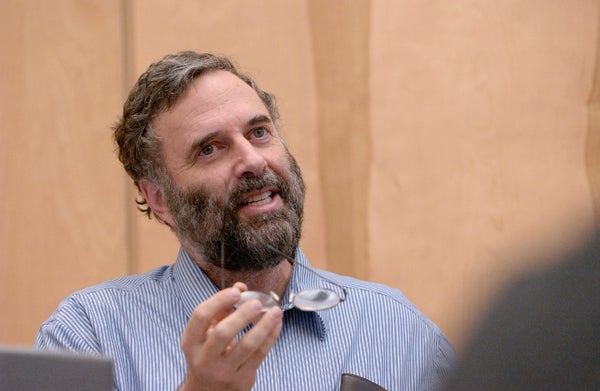|
June 22, 2011
A group of randomly selected citizens, engaged in a new kind of polling developed at Stanford, gathers this weekend to tackle California's problems
A Deliberative Polling activity organized by a variety of academics and civic organizations is held in Torrance. By Dan Stober

Professor James Fishkin, international communication (Photo by Linda A. Cicero / Stanford News Service) Opinion polls typically ask members of the public how they stand on the issues, whether they know much about the issues or not.
That seemed like a flaw in the process to Stanford communication professor James Fishkin, who pondered the question, "Would people have the same response if they took the time to learn about the issues?"
The answer, it turns out, is that many people, once they gain a grasp of the issues, change their minds. In 16 countries, Fishkin has surveyed random samples of ordinary citizens and then brought them together for days-long discussions with each other and with competing experts on the topics.
When the talking ends, and the participants take a new survey, the polling has changed significantly on 70 percent of the questions asked. When people have a good chance to consider competing arguments about an issue, they very often change their minds.
Now Fishkin, of the Center for Deliberative Democracy at Stanford, has set off with colleagues from a number of institutions to do something slightly – but significantly – different. The gathering in Southern California this weekend will go beyond talk. Fishkin hopes the best of the ideas or shared opinions to surface from the dialogue will make it onto the statewide ballot during the general election in November 2012.
It is fitting, Fishkin said, that proposals arising from a dialogue with ordinary citizens should be placed before the voters on the 100th anniversary of the California initiative process, the nation's most active example of direct democracy. The initiative, born from the progressive reform movement, is needed now when California's government is staggering and unable to solve its problems, he said: "The state faces big problems. There are lots of solutions from the policy elites, but the public doesn't want to hear them. They're suspicious."
Deliberative Polling answers the question, "How can the people thoughtfully and in a nonpartisan way take ownership of some solutions?"
The 300 people gathering to deliberate in Torrance during "What's Next California" have been chosen randomly, but in a science-based way that produces a group that reflects the demographics of California. They'll come together from around the state for a weekend of face-to-face discussions in small groups and will have their questions answered by public officials and policy experts. The weekend will be moderated by Judy Woodruff of the PBS NewsHour and videotaped for a documentary to be broadcast on PBS stations.
The participants have already been polled and will be polled again at the beginning and end of their time together. Fishkin hopes that this small group of ordinary citizens, "a microcosm of the state," will thoughtfully set the agenda for California's public debate and that through the initiative process, the state's voters will make informed decisions about the future. It is a model based on ancient Athens.
"California's initiative process forces Californians to simply record a 'yes' or 'no' opinion on issues," said Lenny Mendonca, a board member of both California Forward and the New America Foundation. "The Deliberative Poll uses focused study and interaction to reveal the conclusions the public could reach given the opportunity to become more informed and more engaged."
Fishkin has conducted Deliberative Polling in, among other places, Bulgaria and Northern Ireland. "Surely we can do the same in California," he said.
The effort is being organized by California Forward, the New America Foundation in California, the Public Policy Institute of California, the Nicolas Berggruen Institute, California Common Cause, the Bill Lane Center for the American West at Stanford University and the Davenport Institute at Pepperdine University. It is being coordinated by the Center for Deliberative Democracy at Stanford University and MacNeil/Lehrer Productions' By the People project.
Editor Note:
Media are invited to cover all or part of the three-day poll, beginning Friday. To receive press credentials or to reserve a lower-cost hotel room in Torrance, please contact Amy Thoma at Amy.Thoma@ogilvypr.com
-30-
|